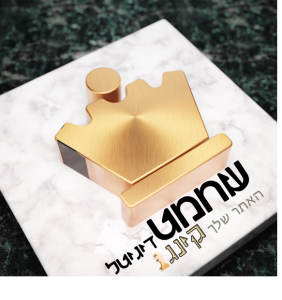..
*With Hashem's help, we will not give up*!
There is a principle: (סופו נעוץ בתחילתו ותחילתו בסופו) ."Their end is attached to their beginning, and their beginning to their end". The end and the beginning are connected to one another. Even the beginning and end of each book of the Torah are connected and there is a common theme between the opening and closing sections.
Pekudei is the last parsha of the book of Shemot. Therefore, we must find the connection between the end of the book of Shemot and its beginning.
At the beginning of the book of Shemot, we find the story of Pharaoh's daughter who stretched out her hand to take the baby she saw in the Nile River. It is written: "וַתֵּרֶד בַּת־פַּרְעֹה לִרְחֹץ עַל־הַיְאֹר וְהַאֲחוֹתֶיהָ הִתְהַלַּכְנָה עַל־יַד הַיְאֹר וַתִּרְא אֶת־הַתֵּבָה בַּגֹּמֶא וַתִּשְׁלַח אֶת־אֲמָתָהּ וַתִּקָּחֶנָּה" (Shemot 2:5). The commentary on the words "and she sent her arm (amata)" quoted by Rashi expounds the word (amata to mean arm and the verse to means that her actual arm elongated many cubits.
את אמתה. …… וְרַבּוֹתֵינוּ דָּרְשׁוּ (סוטה שם), לְשׁוֹן יָד, …. דָּרְשׁוּ אֶת אֲמָתָהּ – אֶת יָדָהּ, וְנִשְׁתַּרְבְּבָה אַמָּתָהּ אַמּוֹת הַרְבֵּה: (רש"י שמות ב' ה')
.
At the end of the book of Shemot, the Mishkan was completed and ready for be erected, but no one was able to raise it up, since it was so heavy. Therefore, it was brought to Moshe to deal with erecting it.
How was Moses supposed to raise up something so heavy, when everyone together had failed?
Rashi tells us (39:33) that God told him: "Put your hand to it, and then it will stand up by itself" (שְׁמוֹת ל״ט:לג, Shemot 39:33):
ויביאו את המשכן וגו'. שֶׁלֹּא הָיוּ יְכוֹלִין לַהֲקִימוֹ; וּלְפִי שֶׁלֹּא עָשָׂה מֹשֶׁה שׁוּם מְלָאכָה בַמִּשְׁכָּן, הִנִּיחַ לוֹ הַקָּבָּ"ה הֲקָמָתוֹ, שֶׁלֹּא הָיָה יָכוֹל לַהֲקִימוֹ שׁוּם אָדָם מֵחֲמַת כֹּבֶד הַקְּרָשִׁים, שֶׁאֵין כֹּחַ בָּאָדָם לְזָקְפָן, וּמֹשֶׁה הֶעֱמִידוֹ; אָמַר מֹשֶׁה לִפְנֵי הַקָּבָּ"ה אֵיךְ אֶפְשָׁר הֲקָמָתוֹ עַ"יְ אָדָם? אָמַר לוֹ עֲסֹק אַתָּה בְּיָדְךָ, וְנִרְאֶה כִּמְקִימוֹ וְהוּא נִזְקָף וְקָם מֵאֵלָיו, וְזֶהוּ שֶׁנֶּ' הוּקַם הַמִּשְׁכָּן (שמות מ') – הוּקַם מֵאֵלָיו; מִדְרַשׁ רַ' תַנְחוּמָא: (רש"י שְׁמוֹת ל״ט:לג)
They brought the mishkon, etc. — for they were unable to erect it. Because Moshe did no work whatsoever in the mishkon God left it for him to erect, for no man was able to erect it because of the weight of the planks for no man had the strength to stand them up, but Moshe stood them up. [Actually, Moshe himself could also not do it but…] Moshe said to God: How is it possible for man to erect it? [Whereupon] He answered him: “You busy yourself with your hand”! It appeared as if he (Moshe) had erected it but it had stood upright of its own. This is what is meant by what is said: “The mishkon was erected” — it was erected on its own. From the Midrash of Rabbi Tanchuma.(Rashi , Shemot 39:33 )
Now, at the beginning of the book of Shemot, we see that Pharaoh's daughter performed an impossible task when she succeeded in obtaining the basket in the Nile . But the question is asked: At first, for what reason did Pharaoh's daughter stretch out her hand to take the basket, when she saw that it was far away from her?
Granted, Moshe performed the impossible in erecting the Mishkan when God told him to try, "Apply labor with your hands."
From where did Pharaoh's daughter know that she would succeed in doing the impossible, that a miracle would happen to her and her arm would be elongated?
Rather, she merely did what was within her ability and power to do, and God blessed her efforts. This teaches us a valuable lesson: We should never refrain from undertaking a task that seems too difficult to attain. If we do what we are supposed to do, with sincere effort, God will bless us with success.
We must remember the words of Rabbi Tarfon:
"פִּרְקֵי אָבוֹת פרק ב משנה טז: "לֹא עָלֶיךָ הַמְּלָאכָה לִגְמֹר, וְלֹא אַתָּה בֶן חוֹרִין לִבְטֵל. " (Pirkei Avot 2:16) It is not incumbent upon you to complete the task, but you are not free to desist from it ….
Many aspirations are not realized because of the thought: "I will not be able to do it all," or "I will never succeed." Maximalism, the pursuit of perfection, and the failure to appreciate partial achievements – all these are the undoing of countless people.
Every achievement is valuable. Even if the path to the summit is blocked, any ascent up the mountain is considered an ascent.
We are not free to "throw up our hands" and despair; we are not permitted to give up and fail to realize the good ideas that arise in our minds. We shall do what is within our ability to do – and we will come out ahead.
Shabbat Shalom and may we blessed the success of our soldiers, the healing of the wounded, and the return of the captives
!חזק חזק ונתחזק
*Rabbi Eliezer Simcha Weisz, Member of the Chief Rabbinate Council of Israel*.

 שחמט דיגיטל
שחמט דיגיטל